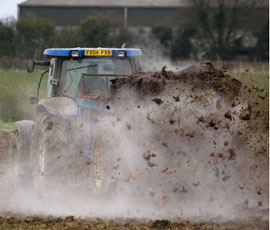Muck for straw arrangements bring joint benefits

Baling straw and using pig manure on arable land could provide a range of benefits for all involved and more farmers could consider baling rather than chopping straw.
With compound fertiliser costing in the region of £350-400/t and nitrogen at more than £300/t, significant savings can be made by using muck produced on straw-based pig units.
Pig manure and slurry contains N, P and K and improves the organic-matter content of soil as well as reducing the reliance on artificial fertiliser with up to 95% available potash.
Working arrangements between livestock producers and arable farmers for straw-for-muck agreements need to be set up on a professional basis with an undertaking to move the straw as quickly as possible, provide analysis so the receiving farm can apply the product more accurately as well as using flotation type tyres on machinery to avoid ground compaction.
Straw-based pig rearing and finishing will account for approximately 250kg of straw per finisher pig place per year and outdoor herds use an estimated 600-800kg of straw per sow per year.
With additional demand for straw for power stations and other uses, ex-farm prices for baled straw are currently quoted in the £50/t region, providing the arable farmer with a useful additional income as well as the benefits of improving soil structure and fertility.
Baling straw can help to break the pest and disease cycle rather than chopping and relying on increasingly expensive compound fertilisers at a time when livestock farmers and pig producers could make good use of the product.
Agronomists will provide valuable professional assistance in drawing up suitable supply arrangements between the parties leading to benefits all round, but if straw becomes an overpriced commodity this could lead to further closures of high-welfare pig units in the longer term.
